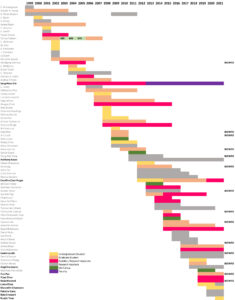 Current estimates suggest that 20% of all human cancers have viral origin or require viral infection as an essential cofactor. Our research seeks to understand viral tumorigenesis, specifically cancers caused by Kaposi’s sarcoma-associated herpesvirus (KSHV/HHV-8). KSHV is a double-stranded DNA virus belonging to the Rhadinovirus family of human herpesviruses. It was discovered in 1994 and is associated with Kaposi’s sarcoma (KS) as well as B-cell cancers like primary effusion lymphoma (PEL) and multicentric Castleman’s disease (MCD). These diseases affect internal organs and are ultimately fatal; they are usually seen in the U.S. among immunosuppressed individuals like HIV-positive individuals and transplant patients.
Current estimates suggest that 20% of all human cancers have viral origin or require viral infection as an essential cofactor. Our research seeks to understand viral tumorigenesis, specifically cancers caused by Kaposi’s sarcoma-associated herpesvirus (KSHV/HHV-8). KSHV is a double-stranded DNA virus belonging to the Rhadinovirus family of human herpesviruses. It was discovered in 1994 and is associated with Kaposi’s sarcoma (KS) as well as B-cell cancers like primary effusion lymphoma (PEL) and multicentric Castleman’s disease (MCD). These diseases affect internal organs and are ultimately fatal; they are usually seen in the U.S. among immunosuppressed individuals like HIV-positive individuals and transplant patients.
Latest News
-
Kaposi Sarcoma remains common in persons living with HIV
Making the point in response to a recent article in AIDS showing that “Black patients had higher mortality than white or Hispanic patients (hazard ratio 2.07, 95% confidence interval 1.12–3.82), even after adjusting for covariates. This mortality difference correlates with higher rates of advanced Kaposi‘s sarcoma disease and KS-IRIS in black patients compared with other … Read more
-
UNC research program studies COVID-19 variants
While a COVID PCR test indicates whether or not there is genetic viral material in an individual sample, the technique does not reveal the specific variant of coronavirus that made a person sick.
-
It’s Day 6 of Covid, and a Rapid Antigen Test Comes Back Positive. Stay Home, Say Virologists.
http://: https://khn.org/news/article/rapid-antigen-test-isolation-guidance/
-
How worried do you need to be about the BA.2 coronavirus variant?
https://www.today.com/health/health/ba2-coronavirus-variant-rcna14367
About the Lab

Click here to read more about the research interests, goals and methods of the Dittmer Lab.
A list of publications is available on PubMed or go to Publications for complete downloadable .pdf files.
